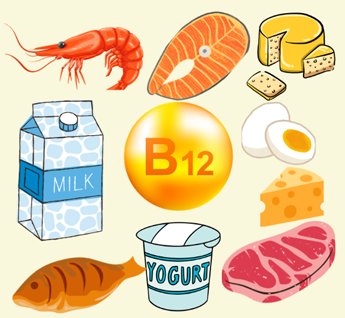Why Vitamin B12 Is Important for Your Health
Vitamin B12 is an essential nutrient your body needs to function at its best. It is a water-soluble, B-complex vitamin which plays a vital role in the red blood cell formation of red blood cells, maintaining healthy nerve function, synthesizing DNA, and supporting overall energy levels.
Since the human body cannot produce vitamin B12, it must be obtained from food or supplements. For adults, the recommended daily intake is 2.4 micrograms. However, many people either don’t get enough through their diet or face absorption issues, leading to a vitamin B12 deficiency—a condition that is particularly common in older adults.

Food Sources of Vitamin B12
Vitamin B12 is found naturally only in animal-based foods, including:
Causes of Vitamin B12 Deficiency
Several factors can lead to vitamin B12 deficiency, including diet, medical conditions, and certain medications. Here are the most common causes:
Plant-based foods do not naturally contain vitamin B12, making supplementation or fortified foods crucial for those on vegan or vegetarian diets.
1. Vegetarian or Vegan Diets: Since plants don’t produce B12, strict vegetarians and vegans are at high risk unless they eat fortified foods or take supplements.
2. Weight-Loss Surgery: Bariatric surgeries often reduce the body’s ability to absorb vitamin B12 from food, increasing the risk of deficiency.
3. Small Intestine Bacterial Overgrowth (SIBO): When harmful bacteria grow excessively in the small intestine, they consume available vitamin B12, leaving little for the body to absorb.
4. Tapeworm Infections: Eating undercooked, contaminated fish can lead to tapeworm infections, and these parasites feed on vitamin B12.
5. Digestive Disorders: Conditions such as celiac disease or Crohn’s disease can interfere with nutrient absorption, including B12.
6. Low Stomach Acid: Older adults and those using common heartburn medications (like proton pump inhibitors or H2 blockers) may produce less stomach acid, which is necessary for B12 absorption.
7. Pernicious anemia: Vitamin B12 deficiency caused by the body’s inability to absorb B12 due to a lack of intrinsic factor, a protein in the stomach.
Symptoms of Vitamin B12 Deficiency
B12 deficiency can develop gradually or appear suddenly, making it tricky to diagnose. Common symptoms include:
-
Tingling or numbness in hands, legs, or feet
-
Balance problems or difficulty walking
-
Fatigue and weakness
-
Anemia
-
Swollen or inflamed tongue
-
Cognitive difficulties, such as poor memory or trouble thinking clearly
If left untreated, long-term deficiency can cause irreversible nerve damage and other serious health problems.
How to Boost Your Vitamin B12 Levels
Depending on your diet and health status, here are effective ways to meet your B12 needs:
-
Eat B12-rich animal products regularly if you’re not vegetarian or vegan.
-
Include fortified foods like cereals, breads, or plant-based milk alternatives.
-
Take a daily multivitamin—most contain around 6 micrograms, well above the daily requirement.
-
Talk to your doctor about B12 injections or high-dose supplements if you have absorption issues.
Bottomline
Vitamin B12 is essential for energy, brain function, and overall health. Since deficiency can be silent but harmful, knowing your risk factors and ensuring adequate intake—through diet, supplements, or medical guidance—is the best way to protect your health. Medical Disclaimer.
Read further on:
≺≺ What foods and vitamins are good for your skin?
≺≺ What eating strategies work best for losing weight long term?
≺≺ What are the top three minerals you can take to boost memory?
≺≺ Why is regular table salt considered unhealthy?
≺≺ What makes Himalayan salt different from regular table salt?
≺≺ What is wrong with ONE-A-DAY Vitamins?
≺≺ What health problems are linked to consuming corn syrup?
≺≺ What food is most effective for moderating blood sugar?
≺≺ How Do Sugary Meals and Beverages Harm Dental Health?
≺≺ What Is the Ketogenic Diet? Is the Keto Diet Right for Everyone?
≺≺ What is the Okinawan diet? What is the secret behind Okinawan long life expectancy?
≺≺ EWG’s- The Clean Fifteen: Fruits and Vegetables with the Lowest Pesticide Levels.
≺≺ What are antioxidants? How antioxidants in the fruits and vegetables help in preventing cancers and diseases?
≺≺ What foods should people with high blood pressure avoid?
≺≺ How can I reduce the risk of cancer-causing chemicals when cooking or grilling meat?
≺≺ What happens to my blood vessels when I gain weight?
≺≺ What type of exercise is best for lowering my blood sugar?
≻≻ Watch this page for more such informative articles on Health, Nutrition, and Wellness.
≻≻-Back to Home page.
Further reading (External Links opens in new window):
≺≺- Harvard health Publishing – Vitamin B12 deficiency can be sneaky and harmful.
≺≺- Cleveland Clinic – Pernicious-anemia.

